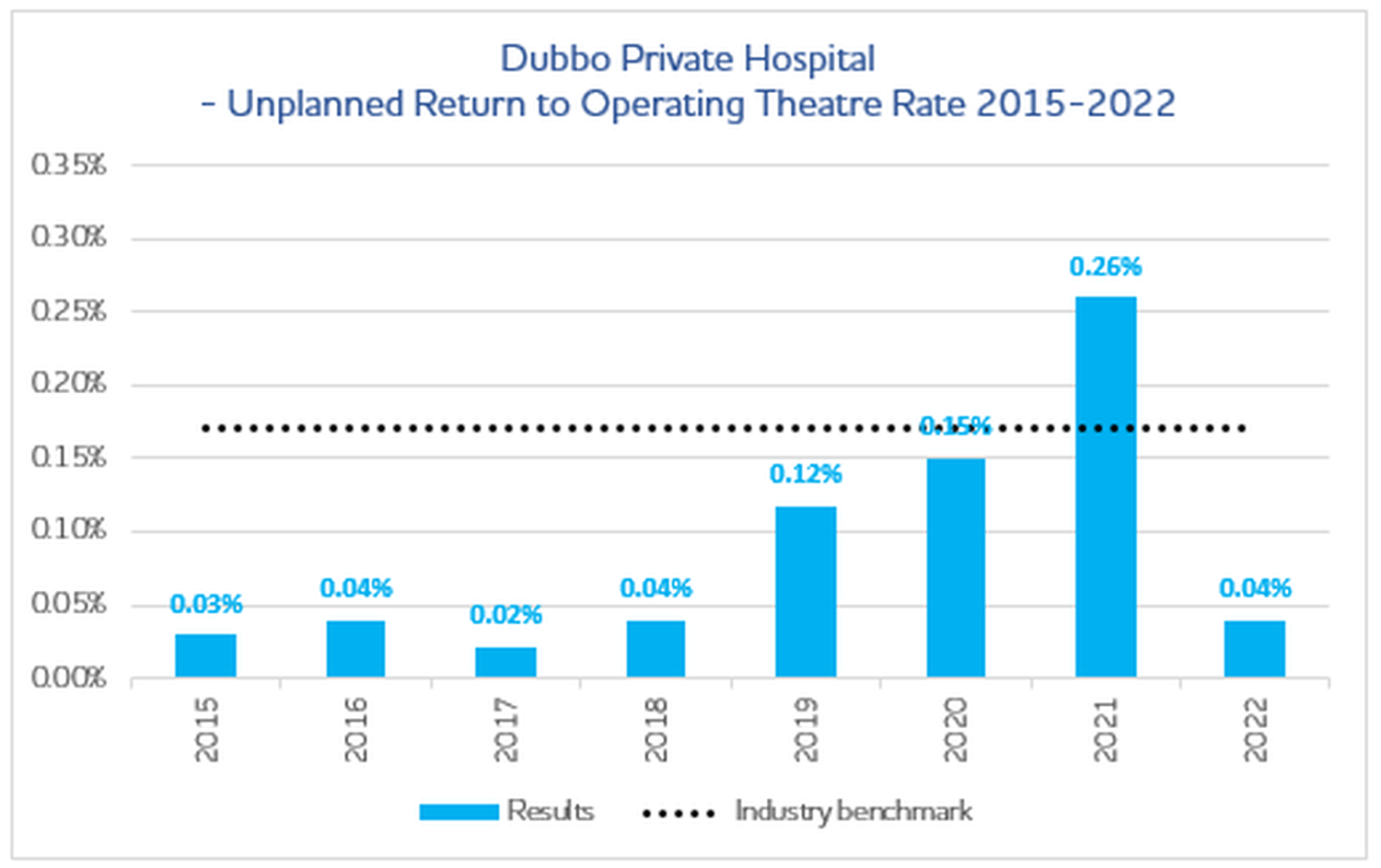Patient Outcomes
As part of our quality framework, we regularly measure and benchmark ourselves against a range of 'Clinical Indicators'.
In accordance with the National Safety and Quality Health Service Standard 2: Partnering with Consumers, the contents of this page have been reviewed by Healthe Care Consumer Advisory Committees at our Healthe Care hospitals.
Infection Prevention and Control
We believe as a result of our clinical governance and risk minimisation strategies and our corporate culture of committing to a continuous improvement strategy we are able to demonstrate above average outcomes for our patients and more importantly less hospital acquired complications associated with their hospital stay. Infection prevention and control is just one way were we demonstrate less complications for our patient
Infection Rate (Staph Aureus Bacteraemia otherwise known as SAB)
Dubbo Private Infections
Germs can cause an infection known as staphylococcus aureus bacteraemia (SAB) which needs antibiotic treatment if it enters the blood. Some serious strains are resistant to antibiotics. Our rate of infection is almost at zero and well below the national average for hospitals.
Dubbo Private Hospital's rate of infection is zero, well below the national average for hospitals. To reduce the risk of hospital acquired infections, we use best practice infection prevention and control with a focus on hand washing as this is the most effective way to stop germs spreading or entering the blood.
We provide continual education and training to all our caregivers to ensure we keep our infection rate well below the national target.
The graph below shows the number of patients that developed a hospital acquired Staphylococcus Aureus Bacteraemia (SAB) infection. The Dubbo Private Hospital rate is lower (better) than the industry benchmark. Dubbo Private Hospital has a number of risk mitigation strategies in place to reduce the risk of transmission of Health Care Associated Infections.
The most valuable prevention is for everyone to wash their hands, patients, visitors and health professionals alike.
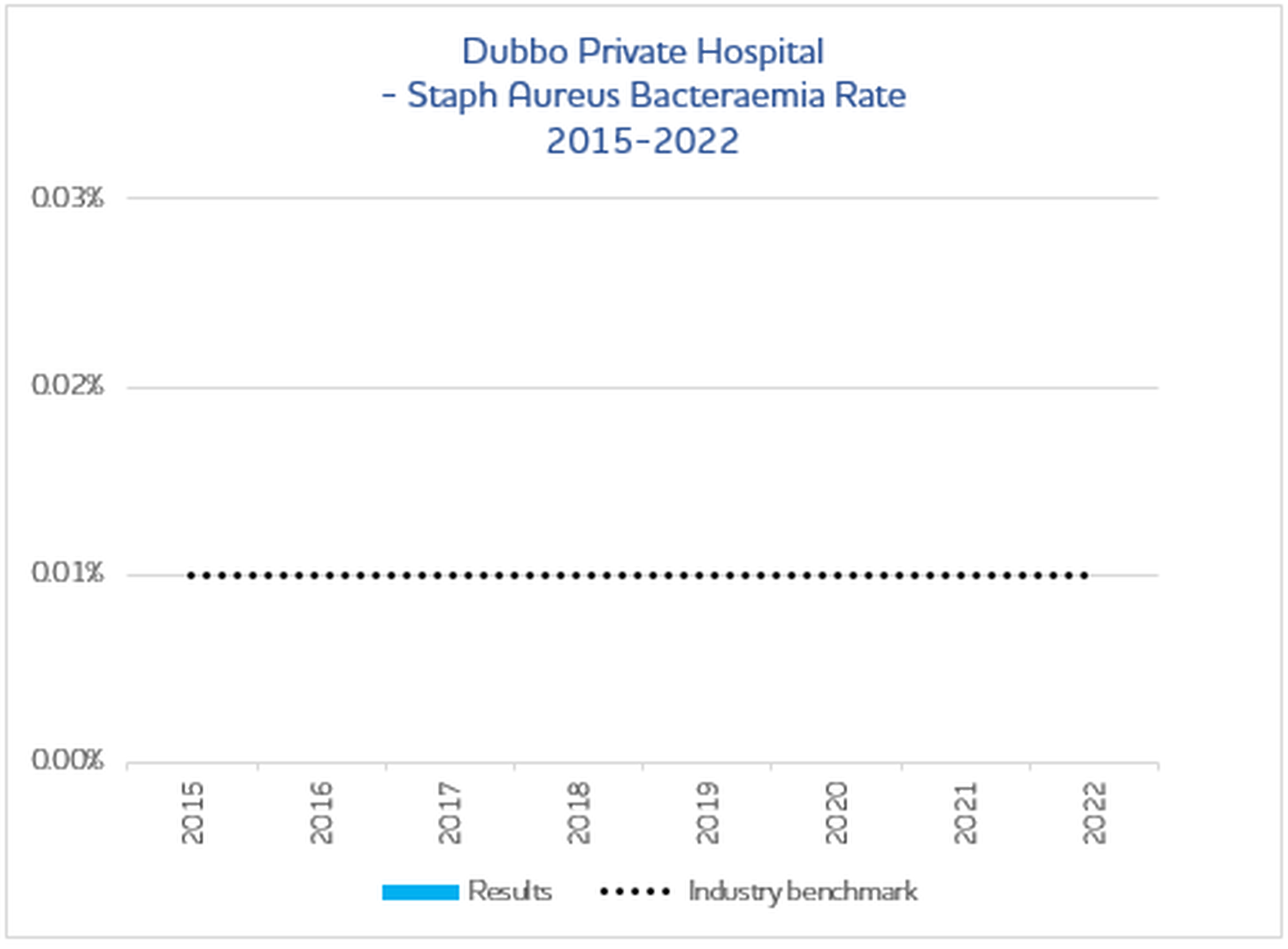
Clostridium Difficile (also known as C Diff)
Dubbo Private Infections
C Diff is an infection of the bowel that causes diarrhoea. It can be caused by too many courses of antibiotics or very strong doses of antibiotics. The industry rate varies from 2 to 3 cases per 10,000 days of patient care.
The graph below shows the Clostridium Difficile infection rate at Dubbo Private Hospital is well below the industry average, meaning a patient is less likely to develop a C Diff infection at Dubbo Private Hospital.
To reduce the risk of these hospital acquired infections, we use best practice infection prevention and control with a focus on hand washing as this is the most effective way to stop germs entering the blood. We provide continual education and training to all our healthcare workers to ensure we keep our infection rate well below the national target.
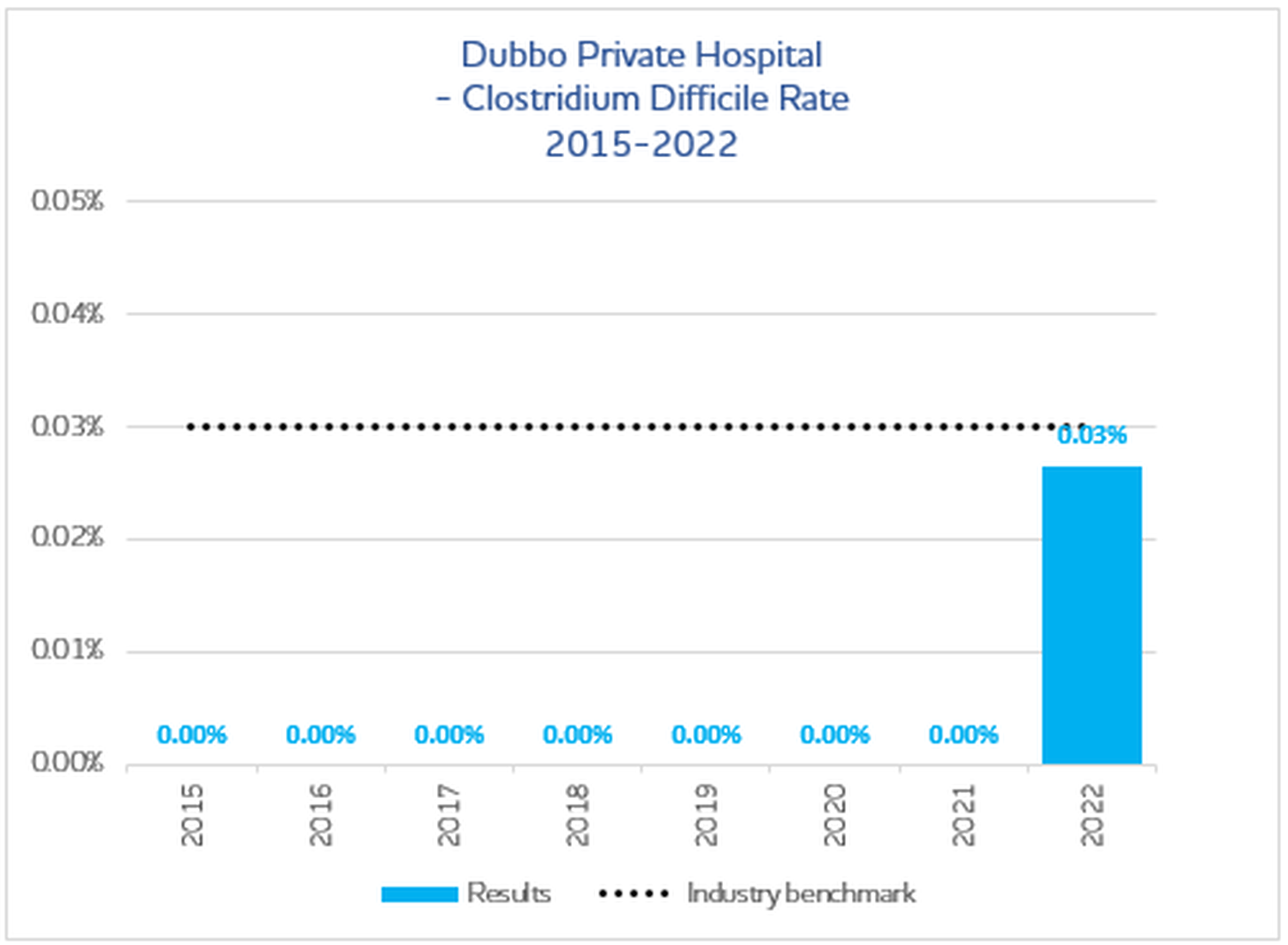
Hand Hygiene
Dubbo Private Hospital Hand Hygiene Compliance
Hand hygiene (or hand washing) is one of the best ways to stop infections so, as a priority, we educate and train all caregivers in the World Health Organisation’s (WHO) “five moments” for hand hygiene. We also audit our staff and provide our results to Hand Hygiene Australia (HHA) to compare us against other Hospitals.
Dubbo Private Hospital ranks higher than national targets for hand hygiene. Our auditors complete compliance audits on a regular basis and submit data three times a year and we participate in the national hand hygiene strategy to continually improve our rates.
The graph below shows our Hand Hygiene compliance rates are above (better) than the Industry benchmark.
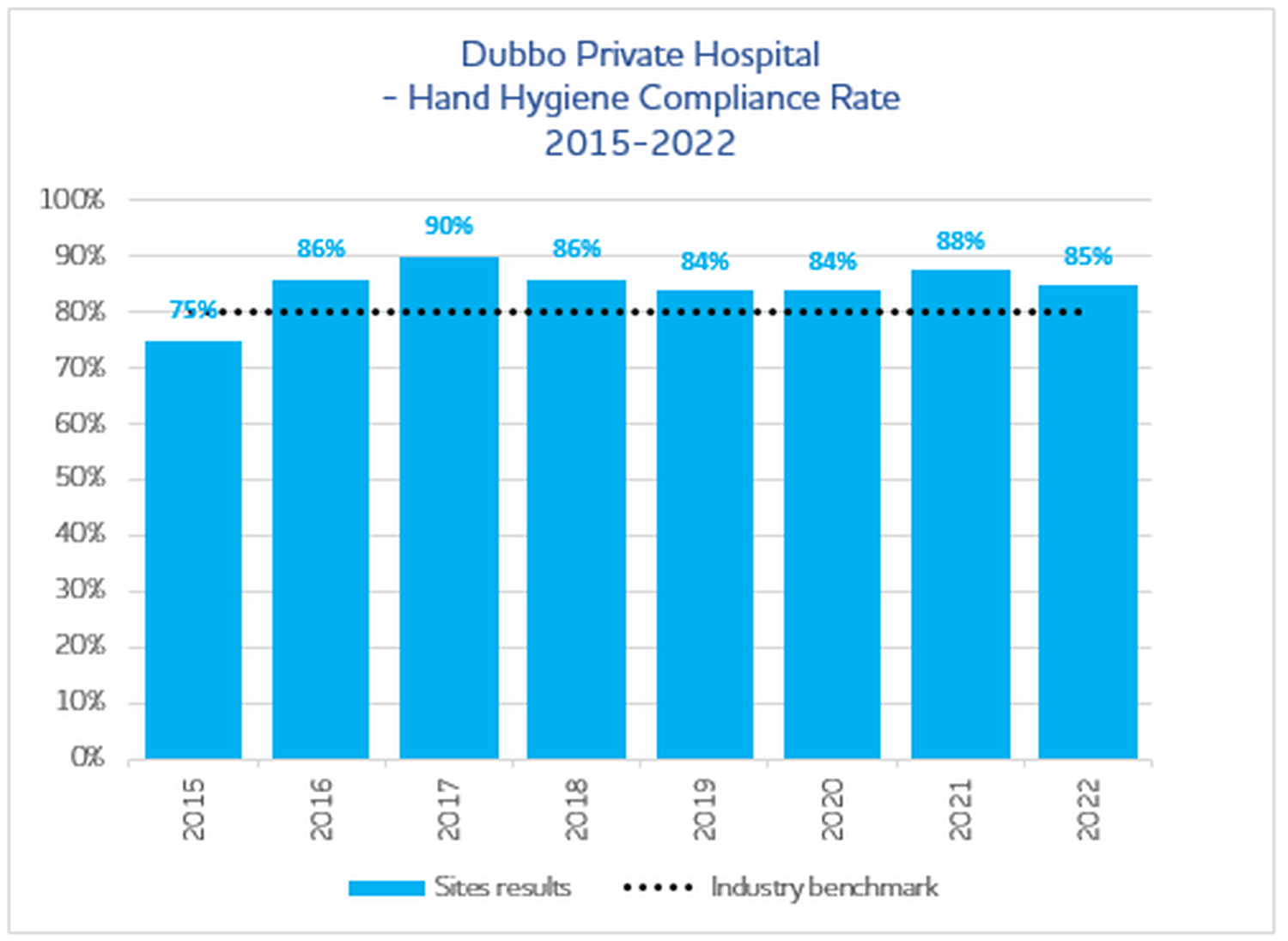
Inpatient Falls resulting in Significant Injury
Dubbo Private Hospital Inpatient Fall Rates
A fall in a hospital is when a patient suddenly and unintentionally falls to the ground or lower level. This can happen in a hospital setting for a number of reasons, such as a change in medication, the after affects of an anaesthetic, or just because the surroundings are unfamiliar. Falls can injure patients and affect their recovery and independence.
The graph below shows the number of patients that sustained a fall that caused an injury as a percentage of total patient bed-days (the number of days that all patients spend in hospital). Dubbo Private Hospital's rate is currently below (better than) the industry benchmark.
We actively manage and work to prevent falls through our established Falls Prevention and Management Program and an electronic incident management and reporting system so we can monitor trends and make improvements. A variety of best practice tools and prevention intervention guidelines are utilised to identify those consumers at high risk of having a fall.
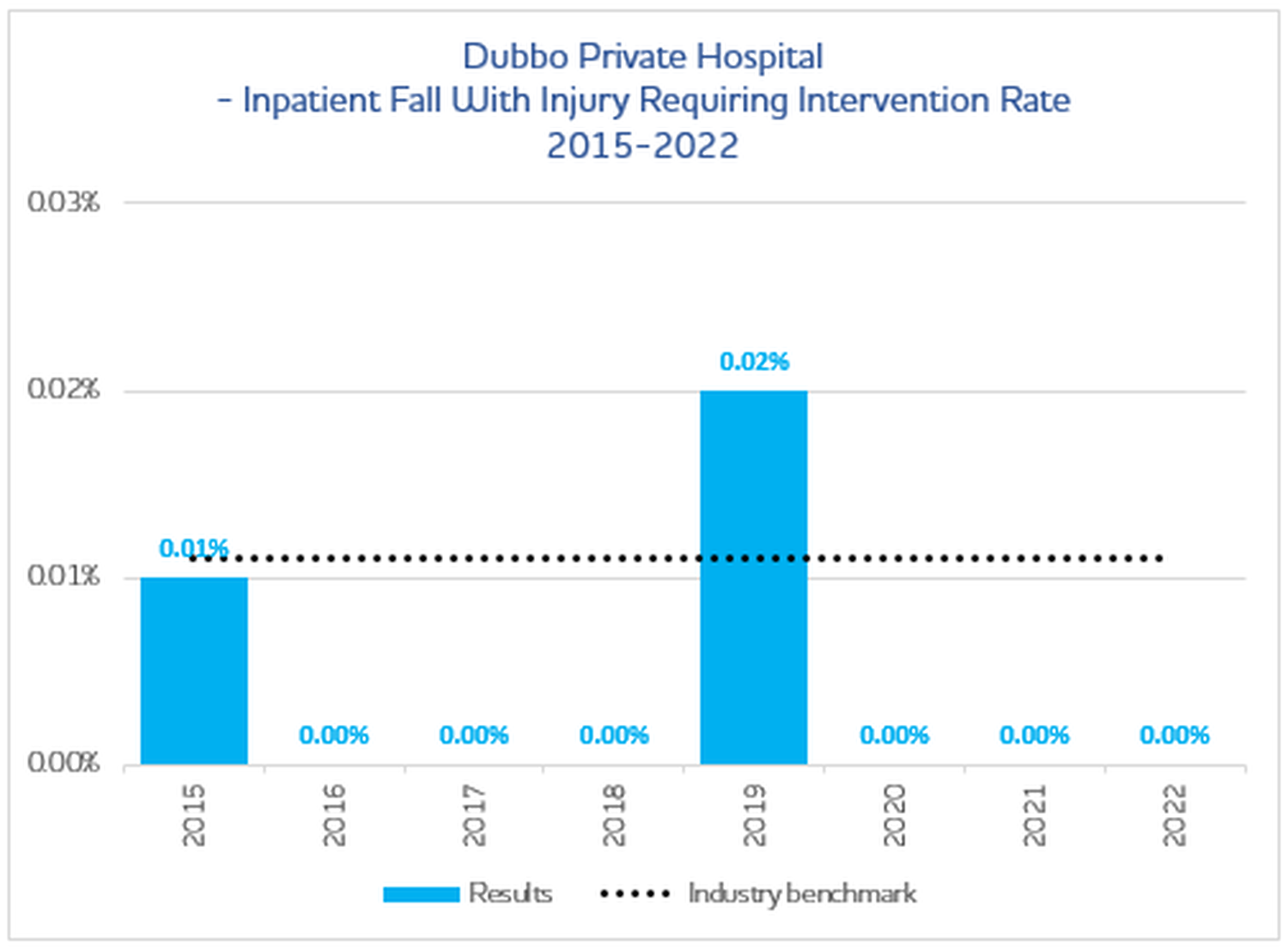
Unplanned Readmissions
Dubbo Private Hospital Unplanned Readmissions
Monitoring of this information is very important as it provides an indication of the effectiveness of our planning processes for when people are discharged from hospital
The graph below shows the number of patients that were readmitted to hospital within 28 days of discharge from hospital, with a diagnosis related to the same condition as the original admission.
Dubbo Private Hospital's rate is lower (better) than the industry benchmark. This is achieved for example through the presence of dedicated Discharge Planners and other Allied Health staff as part of better discharge planning initiatives, plus preadmission clinics where discharge needs are identified prior to admission.
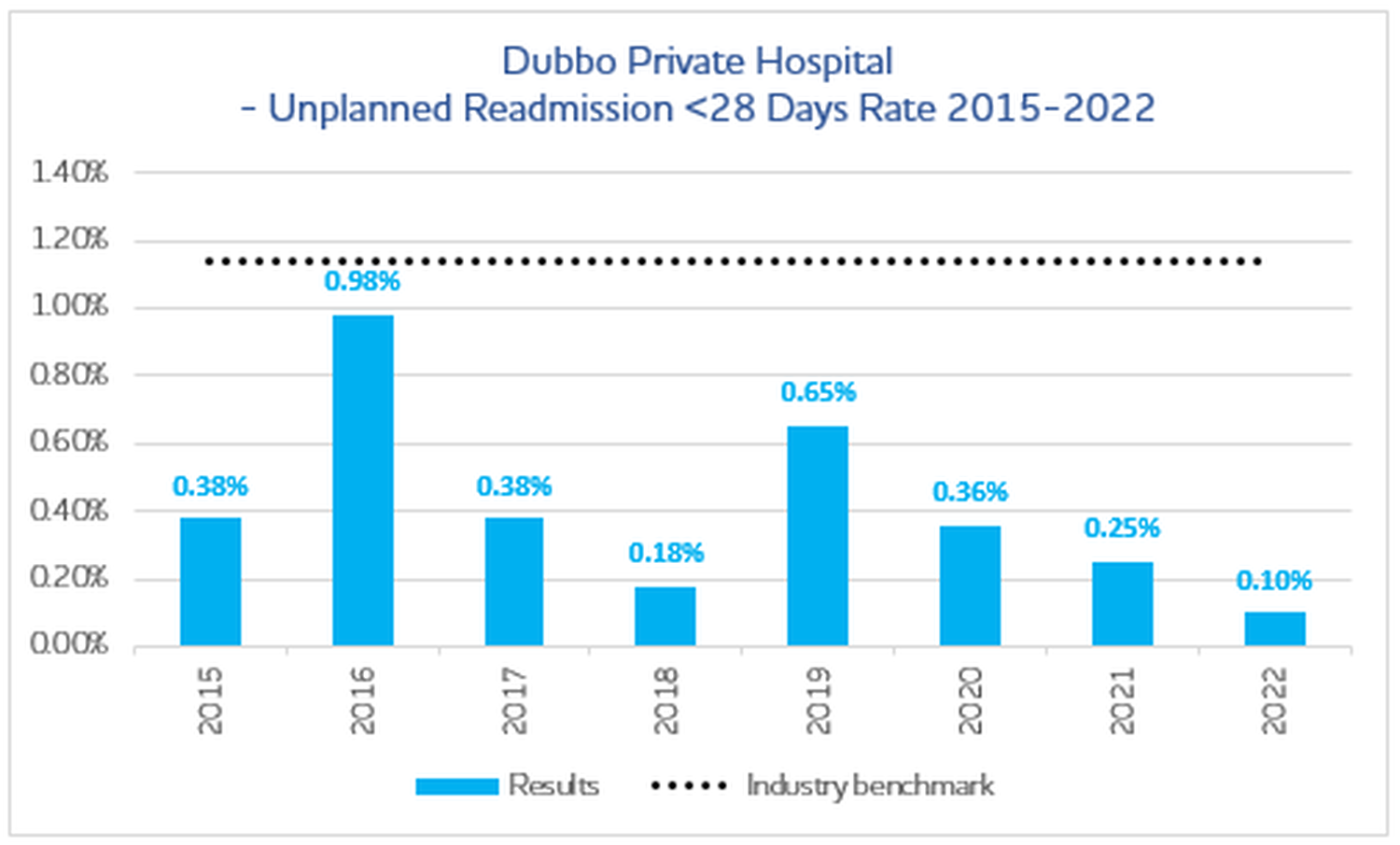
Unplanned Returns to Operating Theatre
Dubbo Private Hospital Unplanned Returns
Dubbo Private Hospital's doctors undertake surgery in many speciality areas which range from minor procedures to more complex surgery requiring specialised care. We monitor our patient outcomes by comparing any unplanned returns to the operating theatre to other Australian hospitals nationally. The aim is to reduce returns to the operating theatre where possible; however there are many factors which influence this and in some cases it is necessary to have further surgery to save a life.
Unplanned returns to the operating theatre are frequently due to complications, for example to treat bleeding or other problems occurring early after the operation. Some complications following complex surgery are to be expected due to patients’ pre-existing diseases or conditions and the nature of the disease or condition being treated. Unplanned returns to the operating theatre are reported and clinical outcomes analysed. Recommendations are actioned and monitored to ensure improvements are made where possible
The graph below shows the number of patients that had a surgical procedure or operation and required an unplanned return for further surgery during the same admission. Dubbo Private Hospital’s rate is lower (better) than the industry benchmark.
